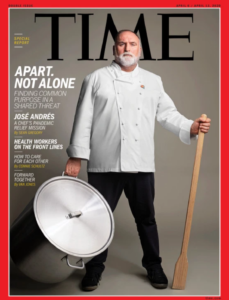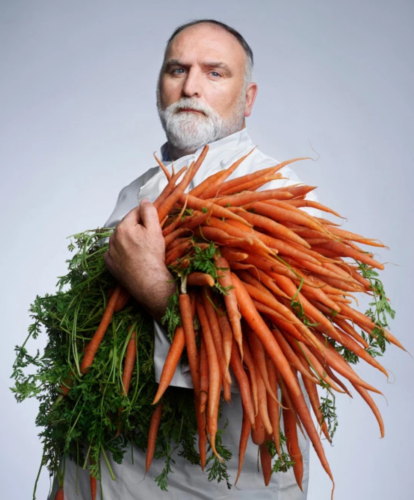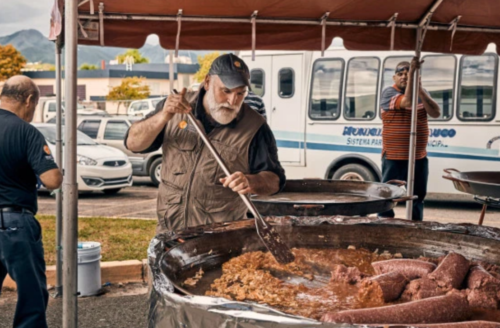
Apart Not Alone Jose Andres Time Magazine Cover Photograph by Martin Schoeller for TIME
By Sean Gregory, TIME, March 26, 2020
https://time.com/collection-post/5809169/jose-andres-coronavirus-food/?utm_source=pocket-newtab
Not many people were getting on airplanes in the U.S. on March 12, and even fewer were heading for the Grand Princess cruise ship. COVID-19 was discovered among the ship’s 2,400 passengers after it set sail from Hawaii, making the vessel about as popular as the Flying Dutchman; the Grand Princess had to loiter off the California coast for days before being given permission to berth.
But here was José Andrés, marching down an air bridge in Newark, N.J., for a 6:30 a.m. flight to San Francisco. His beige, many-pocketed vest and matching cap put out a vaguely fisherman vibe, but anyone who placed Andrés—he’s a celebrity chef—might also recognize the gear he changes into when he’s racing to the scene of disaster. The flight was long, and there was plenty of time to contemplate the dimensions of the catastrophe already silently spreading across the country below.
“I feel like if something major happens, the America we see from this window …” he says, trailing off as he looks out over the Rocky Mountains. He had mentioned the shortages of surgical masks and corona-virus tests, and now let the next thought remain unspoken. “This is like a movie, man. Maybe we’re overreacting. But it’s O.K. to overreact in this case.”
Andrés’ rapidly expanding charity, World Central Kitchen, is as prepared as anyone for this moment of unprecedented global crisis. The nonprofit stands up field kitchens to feed thousands of people fresh, nourishing, often hot meals as soon as possible at the scene of a hurricane, earthquake, tornado or flood. As a global public-health emergency, COVID-19 hasn’t been limited to any one place. But it pulverizes the economy as it rolls across the world, and people need money to eat. World Central Kitchen already is distributing meals in low-income neighborhoods in big cities like New York, and monitoring the globe for food shortages elsewhere, some sure to be acute.

Andrés has won James Beard Foundation honors as outstanding chef and humanitarian
In the meantime, Andrés is a lesson of leadership in crisis. In a catastrophe in which the response of the U.S. government has been slow, muddled and unsure, his kitchen models the behavior—nimble, confident, proactive—the general public needs in a crisis (and, so far, has provided it more reliably than the federal government). Consider the Grand Princess. President Donald Trump made crystal clear he would have preferred that people remain on the vessel so the infected passengers would not increase the tally of cases he appeared to see as a personal scoreboard (“I like the numbers being where they are”). Then, a few breaths later, the President said he was deferring to experts, which made life easier for the quarantined passengers and crew who disembarked, a few hundred at a time, over a week, but harder for Americans looking for the clear, unambiguous instruction that’s so essential to public health. “We have a President more worried about Wall Street going down,” says Andrés, “than about the virus itself.”
At the port of Oakland, where the Grand Princess finally docked, Andrés’ team made its own statement. Setting up a tent at the side of the ship, it forklifted fresh meals not only for the quarantined passengers but also for the crew. “When we hear about a tragedy, we all kind of get stuck on ‘What’s the best to way to help?’” playwright and producer Lin-Manuel Miranda, who first connected with Andrés in 2017 during the Hurricane Maria relief efforts, tells TIME. “He just hurries his ass over and gets down there.”
Andrés, at the age of 50, is charismatic, impulsive, fun, blunt and driven, an idealist who feeds thousands and a competitor who will knock you out of the lane on the basketball court. He is also among America’s best-known cooks. His ThinkFoodGroup of more than 30 restaurants includes locations in Washington, D.C.; Florida; California; New York and five other states; and the Bahamas. They run the gamut from avant-garde fare to a food court that the New York Times restaurant critic called the best new establishment in New York in 2019. But in recent years, Andrés, an immigrant from Spain, has attracted more attention with his humanitarian work. World Central Kitchen prepared nearly 4 million meals for residents of Puerto Rico in the wake of the devastation wrought by Maria (he titled his best-selling book about it We Fed an Island). The organization has launched feeding missions in 13 countries, serving some 15 million meals and corralling more than 45,000 volunteers. Andrés was nominated for the 2019 Nobel Peace Prize.
Upon landing in the Bay Area, he hopped on the phone with Nate Mook, World Central Kitchen’s executive director, to discuss a potential partnership with Panera Bread to give away meals. He put on a mask and visited the kitchen his organization had set up at the University of San Francisco, where several dozen workers prepared jambalaya and salads for quarantined passengers. He thanked his workers—many of whom are veterans of past feeding efforts—but noted the risks of overcrowding a relief kitchen in the era of COVID-19. “Less people is better,” he told a World Central Kitchen staffer. “If not, we’re going to fall like flies.”
Chef José Andrés poses for a portrait while holding a large bundle of carrots
Martin Schoeller for TIMEAndrés has won James Beard Foundation honors as outstanding chef and humanitarian
Next stop: the cruise ship, to distribute meals. On the ride over the Bay Bridge to Oakland, Andrés was already managing past the task at hand, as he spoke to Mook about financing a mass feeding program. “This is going to be something remembered in the history books,” he says. “This is going to be beyond Sept. 11, beyond Katrina. Think big. Because every time we think big, we deliver. And the money always shows up.” Later that evening, Andrés and his staff huddled with leaders of an Oakland-based company, Revolution Foods, who have contracts to cook and deliver school lunches: they’ve continued operating during the COVID-19 emergency. Andrés urged the company’s CEO and head chef to isolate cooks so they steer clear of infection. He coached them on forging partnerships-: with restaurants ordered shuttered, Andrés noted, many cooks will soon be out of work and itching to help.
“My friends,” Andrés told his staff, “maybe this is why World Central Kitchen was created.”
It was during Hurricane Maria that Andrés learned to cut through government bureaucracy to fill a leadership vacuum and feed the masses. From a niche nonprofit supporting sustainable-food and clean-cooking initiatives in underdeveloped countries like Haiti, World Central Kitchen has become the world’s most prominent first responder for food. In some ways, the face of global disaster relief is a burly man fond of shouting “Boom!” when he hears something he likes, and leaning his body into yours when he wants to make a point. Andrés and his field workers flock to disaster sites across the world, often acting as some of the first on-the-ground social-media reporters. They’ve deployed to wildfires in California, an earthquake in Albania, a volcanic eruption in Guatemala.
When Hurricane Dorian made landfall in the Bahamas last September, World Central Kitchen commandeered helicopters and seaplanes to take meals to the Abaco Islands, which lay in rubble. “In the end, we brought hope as fast as anybody has ever done it,” says Andrés. “No one told me I’m in charge of feeding the Bahamas. I said I’m in charge of feeding the Bahamas.” This year, World Central Kitchen workers went to Australia to help residents affected by the bushfires, and to Tennessee after tornadoes in the Nashville area killed at least 25 people.

Jose Andres stirs a pan in Puerto Rico after an earthquake
Christopher Gregory-Rivera for TIMEIn January, Andrés stirs a pan in Puerto Rico after an earthquake
It was not caught flat-footed by the coronavirus. In February, World Central Kitchen forklifted food onto another infected Princess cruise ship, the Diamond Princess, docked off Yokohama, Japan. Field-operations chief Sam Bloch had flown from the bushfire mission in Australia to Los Angeles and rerouted himself back across the Pacific. On March 15, as states ordered public spaces closed, Andrés announced the conversion of five of his D.C.-area restaurants, and his outlet in New York City, into community kitchens. As of March 25, World Central Kitchen has worked with partners to coordinate delivery, via 160 distribution points, of more than 150,000 safe, packaged fresh meals for families in New York City; Washington, D.C.; Little Rock, Ark.; Oakland; New Orleans; Los Angeles; Miami; Boston; and Madrid. Across the country, the organization’s “Chefs for America” online map pinpoints 346 restaurants and 567 school districts providing meals. On March 23 and 24, Andrés drove around D.C. to give out more than 13,000 N95 respirator masks, left over from prior World Central Kitchen cruise feeding operations, to health care workers fighting COVID-19 on the front lines.
“We need to make sure we are building walls that are shorter and tables that are longer,” Andrés likes to say, making explicit his difference with Trump. He pulled out of a restaurant deal at Trump’s D.C. hotel after the candidate announced his campaign by referring to Mexicans as “rapists.” (The Trump Organization sued; ThinkFoodGroup countersued; the case was settled.) During the government shutdown in early 2019, World Central Kitchen and partners cooked 300,000 meals for furloughed federal workers living paycheck to paycheck. On a plane to Las Vegas recently, Andrés told me, a Trump supporter said to him that although he knew the chef didn’t like “my boy,” he still considered Andrés a good guy.
“What we’ve been able to do,” says Andrés, “is weaponize empathy. Without empathy, nothing works.”
Andrés was raised in the north of Spain, the son of nurses. Cooking was always alluring. “The touching, the transformation of things, the smells of it, the tastes of it, it brought people together,” Andrés says. “I love clay. I love fire. Maybe I’m a distant relative of Prometheus.” He is fond of telling one story: when he was a boy, he always wanted to stir the paella pan, but his father wouldn’t let him cook. He first had to learn to control the fire.
After culinary school in Barcelona and a stint in the Spanish navy cooking for an admiral, Andrés arrived in New York City in 1991 as a 21-year-old chef with $50 in his pocket. He moved to D.C. a few years later to help start a Spanish-themed restaurant, Jaleo, and helped popularize tapas in the U.S. Success gave him the freedom to open more restaurants and experiment with new fare. In 2016, minibar, in D.C., which offers a tasting menu of a few dozen small courses, earned the coveted two-star Michelin rating. “He’s probably the most creative chef in the world today,” says French chef Eric Ripert, whose own flagship New York restaurant, Le Bernardin, regularly ranks among the best on the planet. Ripert points to a waffle stuffed with foie gras mousse, served at barmini—minibar’s companion cocktail and snack lounge—as an Andrés creation that blew him away. “Waffles are not supposed to be savory,” he says. “Your chances of success with that are almost none. You see it coming and you’re like, ‘What is that?’ It’s full of surprise.”

